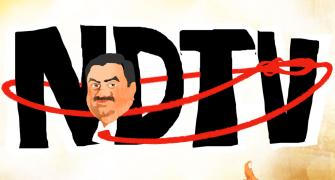Leaders of the world's major powers are being seen in increasingly negative light with people disapproving of the way they are functioning, according to a new survey.
A 47-nation survey by Pew Research Center found worldwide lack of confidence in United States President George W Bush, increasing anti-Americanism, slippage in the image of China and mixed opinion about Russia with confidence in its President Vladmir Putin declining sharply.
"Global distrust of American leadership is reflected in increasing disapproval of the cornerstones of US foreign policy. Not only there is a worldwide support for a withdrawal of troops from Iraq but there is also considerable opposition to US and NATO operations in Afghanistan," the just released survey said.
However, it found that the image of Americans remains positive in Africa. In several African countries, such as Ethiopia and Kenya, it is overwhelmingly positive.
In addition, majorities in two of America's most important Asian trading partners -- India and Japan -- continue to express favourable opinion of the United States.
And the US image has improved dramatically in South Korea since 2003 (from 46 per cent to 58 per cent favourable).
Western European people, it said, are at best divided about keeping troops Afghanistan. In nearly every predominantly Muslim country, overwhelming majorities want US and NATO troops withdrawn as soon as possible.
In addition, it found that global support for the US-led war on terrorism ebbs ever lower.
And the United States is the nation blamed most often for hurting the world's environment, at a time of rising global concern about environmental issues.
At the same time, the survey said China's expanding economic and military power is triggering considerable anxiety.
Large majorities in many countries think that China's growing military might is a bad thing, and the public in many advanced nations are increasingly concerned about the impact of China's economic power on their own countries.
Russia and its president also are unpopular in many countries, the survey says. But criticisms of that nation and its leader are sharpest in Western Europe where many citizens worry about overdependence on the Russian energy supply.
For instance, despite sharp declines in favourable views of the US in France and Germany since 2002, Russia's image in those countries is no better. There is little evidence that discontent with the major nations of the world and their leaders is resulting in greater confidence in those who have challenged the global status quo, the survey said, adding that huge majorities in most countries have little no confidence in Iranian President Mahmoud Ahmadinejad have little confidence that he would do the right thing.
"There also is broad opposition to Iran's acquisition of nuclear weapons. Citizens all around the world voice substantial concern about the threat posed by a nuclear-armed Iran," it said.
The Pew survey finds a general increase in the percentage of people citing pollution and environmental problems as a top global threat. Worries have risen sharply in Latin America and Europe, as well as in Japan and India.
Many people blame the United States and to a lesser extent China for these problems and look to Washington to do something about them.
As was the case in Pew's first major global survey in 2002, global concerns vary significantly by region of the world.
The spread of nuclear weapons is a growing worry in the Middle East -- it is named as a top global danger in that region, along with religious and ethnic hatreds.
AIDS and other infectious diseases continue to be viewed as the dominant threat in Africa and a major concern in Latin America.
The polling also finds that African public is increasingly concerned about the growing gap between rich and poor. In addition, the belief that economic inequality represents a major global danger has become much more prevalent in South Korea and Russia.
In the face of strong criticisms of its foreign policy, the US is cited in many countries about as often as the UN as the entity that should be responsible for dealing with the problems that confront the world.
This is particularly the case among people who are most concerned about the spread of nuclear weapons. But when it comes to AIDS and the gap between rich and poor, many who see these as important threats look to their own countries to provide solutions.








